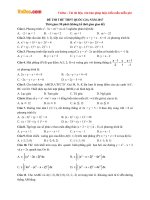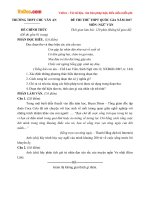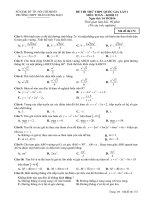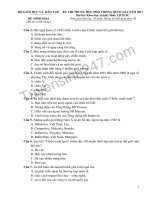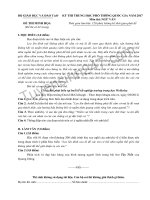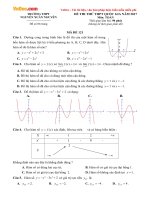- Trang chủ >>
- Đại cương >>
- Kinh tế lượng
Tải Đề thi thử THPT Quốc gia năm 2017 môn Tiếng Anh trường THPT Chu Văn An, Quảng Trị có đáp án - Đề thi thử Đại học môn tiếng Anh
Bạn đang xem bản rút gọn của tài liệu. Xem và tải ngay bản đầy đủ của tài liệu tại đây (174.69 KB, 8 trang )
<span class='text_page_counter'>(1)</span><div class='page_container' data-page=1>
<b> SỞ GD&ĐT QUẢNG TRỊ </b>
<b>TRƯỜNG THPT CHU VĂN AN</b>
<b>KỲ THI THỬ THPT QUỐC GIA NĂM HỌC 2016 – 2017</b>
<b>Môn thi: Tiếng Anh</b>
<i>Thời gian làm bài: {60} phút; (không kể thời gian giao đề)</i>
<i><b>Họ và tên thí sinh:………...…. Lớp:…………...</b></i>
<i><b>Số báo danh:………..………..</b></i>
<i><b>Mark the letter A, B, C, or D on your answer sheet to indicate the word whose underlined part differs </b></i>
<i><b>from the other three in pronunciation in each of the following questions. </b></i>
<b>Question 1. A. walked</b> B. involved <b>C. missed</b> <b>D. jumped</b>
<b>Question 2. A. collect</b> <b>B. operate</b> <b>C. hobby</b> <b>D. volunteer</b>
<i><b>Mark the letter A, B, C, or D on your answer sheet to indicate the word that differs from the other three</b></i>
<i><b>in the position of primary stress in each of the following questions. </b></i>
<b>Question 3. A. apply</b> <b>B. differ</b> <b>C. decide</b> <b>D. protect</b>
<b>Question 4. A. charity </b> <b>B. accurate </b> <b>C. erosion </b> <b>D. dangerous </b>
<i><b>Mark the letter A, B, C, or D on your answer sheet to indicate the word(s) OPPOSITE in meaning to the </b></i>
<i><b>underlined word(s) in each of the following questions. </b></i>
<b>Question 5. “Edwards seems like a dog with two tails this morning”. Haven’t you heard the news? His </b>
wife gave birth to a baby boy early this morning”
<b> A. very proud</b> <b>B. exhausted</b> <b>C. extremely disappointed</b> <b>D. extremely pleased</b>
<b>Question 6.When people are angry ,they seldom act in a rational way.</b>
A. polite <b>B. friendly</b> <b>C. unreasonable</b> <b>D. considerate</b>
<i><b>Mark the letter A, B, C, or D on your answer sheet to indicate the word(s) CLOSEST in meaning to the</b></i>
<i><b>underlined word(s) in each of the following questions. </b></i>
Question 7. The most important thing is to keep yourself occupied. You always have something to do.
A. relaxed B. comfortable <b>C. free</b> D. busy
<b>Question 8: The 1923 earthquake in Japan killed about 200,000 people and left countless wounded and </b>
homeless.
<b> A. poor </b> B. imprisoned C. suffered <b>D. injured</b>
<i><b>Mark the letter A, B, C, or D on your answer sheet to indicate the correct answer to each of the following</b></i>
<i><b>questions. </b></i>
Question 9. The children, ______ parents work late, are taken home by bus.
A. that B. whom C. whose <b>D. their</b>
<b>Question 10: People can become very _______ when they are stuck in traffic for a long time.</b>
A. bad-tempered B. stressful C. pressed <b>D. nervous</b>
<b>Question 11: The boy has just broke a _______ bowl.</b>
<b> A. Russian nice new B. nice new Russian C. Russian new nice</b> <b>D. new nice Russian </b>
Question 12. The lower the level of lighting in a room, _______ .
A. the more slowly our eyes focus B. our eyes focus more slowly
C. more slowly our eyes focus D. the more slowly focus our eyes
<b>Question 13. They have found it terribly hard to _____ ends meet ever since they both lost their jobs.</b>
A. take <b>B. creat</b> <b>C. do D. make</b>
<b>Question 14. Christopher Columbus _______ American more than 500 years ago.</b>
A. discovered <b>B. has discovered</b> C. had discovered D. had been discovering
<b>Question 15. Would it be possible to make an early _______to have my car serviced tomorrow?</b>
<b> A. appoint </b> <b>B. appointing </b> C. appointed <b>D. appointment</b>
<b>Question 16: He was too sure of himself to pay ______ to the warnings against the danger. </b>
<b> A. notice </b> <b>B. attention </b> C. respect <b>D. recognition </b>
<b>Question 17: A good teacher should treat all her students on the same ______</b>
<b>A. terms</b> B. positions C. attitudes <b>D. views</b>
<b>ĐỀ THI THỬ</b>
(Đề thi gồm 04 trang)
</div>
<span class='text_page_counter'>(2)</span><div class='page_container' data-page=2>
Question 18. He ________ lend it to you if you didn’t lose everything.
A. would <b>B. can</b> C. had <b>D. will</b>
Question 19. Handball is fast becoming _____ popular sport worldwide.
A. the <b>B. a C. </b> <b>D. an</b>
<b>Question 20. He’ll be very upset if you turn ______ his offer of help.</b>
A. on <b>B. down </b> C. away <b>D. off</b>
<i><b>Mark the letter A, B, C, or D on your answer sheet to indicate the most suitable response to complete </b></i>
<i><b>each of the following exchanges. </b></i>
<b>Question 21. Two students, Bill and Bob, are talking about their teacher, Ms Young.</b>
Bill: “Ms Young always grades fairly.” Bob: “________ .”
<b>A. I can’t say that it does</b> <b>B. Actually, she is the second best.</b>
<b>C. Really? How could that be?</b> <b>D. I couldn’t agree with you more</b>
<b>Question 22. A woman needs to make an urgent call; she is asking the man for permission to use his phone.</b>
Woman: “Could I use your phone, please? I need to make an urgent call.” Man: “ ________ .”
<b>A. I’d rather not</b> <b>B. Are you kidding?</b> <b>C. Please, do</b> <b>D. No too bad</b>
<i><b>Mark the letter A, B, C, or D on your answer sheet to indicate the sentence that best combines each pair </b></i>
<i><b>of sentences in the following questions. </b></i>
Question 23. Smoking is an extremely harmful habit. You should give it up immediately.
<b>A. As smoking is an extremely harmful habit, you should give it up immediately.</b>
<b>B. You should give up smoking immediately and you will fall into an extremely harmful habit.</b>
<b>C. When you give up smoking immediately, you will affect your health with this harmful habit. </b>
<b>D. Stop your smoking immediately so it will become one of your extremely harmful habits.</b>
<b>Question 24. Several deadly diseases are caused by overeating. Several deadly diseases are also caused by </b>
physical inactivity.
<b>A. Several deadly diseases are caused by overeating, and they are caused by physical inactivity.</b>
<b>B. Several deadly diseases are caused by overeating, so they are caused by physical inactivity.</b>
<b>C. Several deadly diseases are caused by overeating, or they are caused by physical inactivity.</b>
<b>D. Overeating and physical inactivity are caused by several deadly diseases.</b>
Mark the letter A, B, C, or D on your answer sheet to indicate the sentence that is
closest in meaning to each of the following questions.
Question 25. Do your homework first and I’ll let you play the computer games.
<b>A. I won’t allow you to do homework when you play the computer games.</b>
<b>B. Let’s play the computer games without doing your homework.</b>
<b>C. You are allowed to play the computer games without doing your homework.</b>
<b>D. Unless you do homework first, I won’t let you play the computer games.</b>
<b>Question 26</b><i><b>.</b> I haven’t enjoyed myself so much for years.</i>
<b>A. It’s years since I enjoyed myself so much. </b>
<b>B. It has been years since I have enjoyed myself so much.</b>
<b>C. It was years since I had enjoyed myself so much. </b>
<b>D. It’s years since I have enjoyed myself so much.</b>
<b>Question 27. “Why not take a camera with us ?” she said</b>
<b>A. She asked that we not take a camera</b> <b>B. She advised not to take a camera</b>
<b>C. She suggested having a camera with them D. She wanted to know why they left a camera behind</b>
<i><b>Mark the letter A, B, C, or D on your answer sheet to indicate the underlined part that needs correction </b></i>
<i><b>in each of the following questions. </b></i>
<b>Question 28. The assumption that smoking has bad effects on our health have </b> b een prove d .
<b>A</b> <b>B</b> <b>C</b> <b>D</b>
<b>Question 29. The wo</b> o den fence su r r o und e d the house is beginning to f a ll d o wn because of the ra i n .
<b> A B</b> <b> C</b> <b> D</b>
<b>Question 30. Globally and</b> internat i onal ly , the 1990's stood o u t as the warme s t decade in the history of
<b>A</b> <b>B</b> <b>C</b>
</div>
<span class='text_page_counter'>(3)</span><div class='page_container' data-page=3>
<i><b>Read the following passage and mark the letter A, B, C, or D on your answer sheet to indicate the correct</b></i>
<i><b>word or phrase that best fits each of the numbered blanks from 31 to 35. </b></i>
In addition to the challenge to be excellent, American schools have been facing novel problems.
They must cope with an influx of immigrant children, many of whom speak little or no English. They must
respond to demands whether the curriculum reflect the (31) ________cultures of all children. Schools must
make sure (32) ________ students develop basic skills for the job market, and they must consider the needs
of nontraditional students, such as teenage mothers.
Schools are (33) ________ these problems in ways that reflect the diversity of the US educational
system. They are hiring or training large numbers of teachers of English as a second language (34)
________, in some communities, setting up bilingual schools.
Schools are also teaching cognitive skills to the nearly 40 percent of American students who do not
go on to higher education. In the (35) ________ of a recent report by the Commission on Achieving
Necessary Skills, “A strong back, the willingness to work, and a high school diploma were once all that was
necessary to make a start in America. They are no longer today.
<b>Question 31. A. various </b> <b>B. vary</b> <b>C. variety</b> <b>D. varying</b>
<b>Question 32. A. whether</b> <b>B. how</b> <b>C. what</b> <b>D. that</b>
<b>Question 33. A. discharging</b> <b>B. distributing</b> <b>C. addressing</b> <b>D. delivering</b>
<b>Question 34. A. or</b> <b>B. and </b> <b>C. but</b> <b>D. so</b>
<b>Question 35. A. directions</b> <b>B. words</b> <b>C. minds</b> <b>D. ways</b>
<i><b>Read the following passage and mark the letter A, B, C, or D on your answer sheet to indicate the correct</b></i>
<i><b>answer to each of the questions from 36 to 42. </b></i>
The hippopotamus is the third largest land animal, smaller only than the elephant and the rhinoceros.
<b>Its name comes from two Greek words which mean “river horse”.The long name of this animal is often</b>
shortened to the easier to handle term “hippo.”
The hippo has a natural affinity for the water. It does not float on top of the water, instead, it can
easily walk along the bottom of a body of water.The hippo commonly remains underwater for three to five
minutes and has been known to stay under for up to half an hour before coming up for air.
In spite of its name, the hippo has relatively little in common with the horse and instead has a number of
interesting similarities in common with the whale.When a hippo comes up after a stay at the bottom of a
lake or river, it releases air through a blowhole, just like a whale. In addition, the hippo resembles the whale
in that they both have thick layers of blubber for protection and they are almost completely hairless.
<b>Question 36. What is the topic of this passage? </b>
<b> A. The largest land animal.</b> <b>B. The derivations of animal names.</b>
<b> C. The characteristics of the hippo.</b> <b>D. The relation between the hippo and the whale.</b>
<b>Question 37. It can be inferred from the passage that the rhinoceros is ________</b>
<b> A. smaller than the hippo.</b> <b>B. equal in size to the elephant.</b>
<b> C. a hybrid of the hippo and the elephant.</b> <b>D. one of the two largest types of land of animals.</b>
<b>Question 38. The possessive “Its”in line 2 refers to________</b>
A. hippotamus’ <b>B. elephant’s</b> <b>C. rhinoceros’ </b> <b>D. horse’s</b>
<b>Question 39. The word “float” in line 4 is closest in meaning to________</b>
<b> A. sink </b> <b>B. drift </b> <b>C.eat </b> <b>D. flap</b>
<b>Question 40. According to the passage, what is the maximum time that hippos have been known to stay</b>
underwater ________
<b> A.three minutes </b> <b>B. five minutes</b> <b>C. thirty minutes </b> <b>D. ninety minutes</b>
<b>Question 41.The expression “has relatively little in common” in line 8 could be best replaced by ______</b>
A.has few interactions <b>B. is not normally found</b>
C. has minimal experience <b>D. shares few similarities.</b>
<b>Question 42. The passage states that one way in which a hippo is similar to a whale is that________</b>
A. they both live on the bottoms of rivers. <b>B. they both have blowholes.</b>
<b> C. they are both named after horses.</b> <b>D. they both breathe underwater.</b>
</div>
<span class='text_page_counter'>(4)</span><div class='page_container' data-page=4>
Experts in climatology and other scientists are becoming extremely concerned about the changes to
our climate which are taking place. Admittedly, climate changes have occurred on our planet
before. For example, there have been several ice ages or glacial periods.
These climatic changes, however, were different from the modern ones in that they occurred gradually
and, as far as we know, naturally. The changes currently being monitored are said to be the result not of
natural causes, but of human activity. Furthermore, the rate of change is becoming alarmingly rapid.
The major problem is that the planet appears to be warming up. According to some experts, this
warming process, known as global warming, is occurring at a rate unprecedented in the last 10,000 years.
The implications for the planet are very serious. Rising global temperatures could give rise to such
ecological disasters as extremely high increases in the incidence of flooding and of droughts. These in
turn could have a harmful effect on agriculture.
It is thought that this unusual warming of the Earth has been caused by so-called greenhouse gases,
such as carbon dioxide, being emitted into the atmosphere by car engines and modern industrial processes,
for example. Such gases not only add to the pollution of the atmosphere, but also create a greenhouse
effect, by which the heat of the sun is trapped. This leads to the warming up of the planet.
Politicians are also concerned about climate change and there are now regular summits on the subject,
attended by representatives from around 180 of the world's industrialized countries. Of these summits, the
most important took place in Kyoto in Japan in 1997. There it was agreed that the most industrialized
countries would try to reduce the volume of greenhouse gas emissions and were given targets for this
reduction of emissions.
It was also suggested that more forests should be planted to create so-called sinks to absorb greenhouse
gases. At least part of the problem of rapid climate change has been caused by too drastic deforestation.
Sadly, the targets are not being met. Even more sadly, global warnings about climate changes are often
still being regarded as scaremongering.
<b>Question 43. According to the passage, in what way did the climate changes in the ice ages differ </b>
from the modern ones?
<b>A. They occurred naturally over a long period of time. B. They were fully monitored by humans.</b>
<b>C. They were wholly the result of human activity.</b> D. They were partly intended.
<b>Question 44. The word “ alarmingl y ” in paragraph 2 is closest in meaning to </b> .
<b>A. disapprovingly</b> <b>B. worryingly</b> <b>C. surprisingly</b> <b>D. disappointingly</b>
<b>Question 45. According to the passage, agriculture could </b> .
<b>A. give rise to many ecological disasters </b>
<b>B. be directly damaged by the rises in global temperature </b>
<b>C. be indirectly affected by the global temperature rises </b>
<b>D. make the global warming more serious</b>
<b>Question 46. Greenhouse gases cause the warming up of the Earth because they </b> .
<b>A. are emitted by car engines</b> <b>B. trap heat from the sun</b>
<b>C. do not add to atmosphere pollution</b> <b>D. are unusual gases</b>
<b>Question 47. The word “There” in paragraph 5 refers to </b> .
<b>A. regular summits on climate change</b> <b>B. the 1997 summit in Kyoto, Japan</b>
<b>C. the world’s industrialised countries</b> <b>D. the most industrialised countries</b>
<b>Question 48. Which of the following is NOT true, according to the passage?</b>
<b>A. The so-called sinks created by forests can absorb greenhouse gases.</b>
<b>B. Politicians are among those who are concerned about climate change.</b>
<b>C. The problem of rapid climate change has been caused mainly by deforestation.</b>
<b>D. Carbon dioxide is one of the gases that may cause the so-called greenhouse effect.</b>
<b>Question 49. The word “drasti c ” in paragraph 6 is closest in meaning to </b> .
<b>A. severe</b> <b>B. hard</b> <b>C. obvious</b> <b>D. widespread</b>
<b>Question 50. What is probably the writer’s attitude toward global warming?</b>
<b>A. Optimistic</b> <b>B. Neutral</b> <b>C. Positive</b> <b>D. Pessimistic</b>
</div>
<span class='text_page_counter'>(5)</span><div class='page_container' data-page=5>
<b>---KEY:</b>
<i><b>Mark the letter A, B, C, or D on your answer sheet to indicate the word whose underlined part differs </b></i>
<i><b>from the other three in pronunciation in each of the following questions. </b></i>
<b>Question 1. A. walked</b> B. involved <b>C. missed</b> <b>D. jumped</b>
<b>Question 2. A.</b> collect <b>B. operate</b> <b>C. hobby</b> <b>D. volunteer</b>
<i><b>Mark the letter A, B, C, or D on your answer sheet to indicate the word that differs from the other three</b></i>
<i><b>in the position of primary stress in each of the following questions. </b></i>
<b>Question 3. A. apply</b> <b>B.</b> differ <b>C. decide</b> <b>D. protect</b>
<b>Question 4. A. charity </b> <b>B. accurate </b> <b>C.</b> erosion <b>D. dangerous </b>
<i><b>Mark the letter A, B, C, or D on your answer sheet to indicate the word(s) OPPOSITE in meaning to the </b></i>
<i><b>underlined word(s) in each of the following questions. </b></i>
<b>Question 5. “Edwards seems like a dog with two tails this morning”. Haven’t you heard the news? His </b>
wife gave birth to a baby boy early this morning”
<b> A. very proud</b> <b>B. exhausted</b> <b>C</b>. extremely disappointed <b>D. extremely pleased</b>
<b>Question 6.When people are angry ,they seldom act in a rational way.</b>
A. polite <b>B. friendly</b> <b>C</b>. unreasonable <b>D. considerate</b>
<i><b>Mark the letter A, B, C, or D on your answer sheet to indicate the word(s) CLOSEST in meaning to the</b></i>
<i><b>underlined word(s) in each of the following questions. </b></i>
Question 7. The most important thing is to keep yourself occupied. You always have something to do.
A. relaxed B. comfortable <b>C. free</b> D. busy
<b>Question 8: The 1923 earthquake in Japan killed about 200,000 people and left countless wounded and </b>
homeless.
<b> A. poor </b> B. imprisoned C. suffered <b>D</b>. injured
<i><b>Mark the letter A, B, C, or D on your answer sheet to indicate the correct answer to each of the following</b></i>
<i><b>questions. </b></i>
Question 9. The children, ______ parents work late, are taken home by bus.
A. that B. whom C. whose <b>D. their</b>
<b>Question 10: People can become very _______ when they are stuck in traffic for a long time.</b>
A. bad-tempered B. stressful C. pressed <b>D. nervous</b>
<b>Question 11: The boy has just broke a _______ bowl.</b>
<b> A. Russian nice new B. </b>nice new Russian <b>C. Russian new nice</b> <b>D. new nice Russian </b>
Question 12. The lower the level of lighting in a room, _______ .
A. the more slowly our eyes focus B. our eyes focus more slowly
C. more slowly our eyes focus D. the more slowly focus our eyes
<b>Question 13. They have found it terribly hard to _____ ends meet ever since they both lost their jobs.</b>
A. take <b>B. creat</b> <b>C. do D</b>. make
<b>Question 14. Christopher Columbus _______ American more than 500 years ago.</b>
A. discovered <b>B. has discovered</b> C. had discovered D. had been discovering
<b>Question 15. Would it be possible to make an early _______to have my car serviced tomorrow?</b>
<b> A. appoint </b> <b>B. appointing </b> C. appointed <b>D</b>. appointment
<b>Question 16: He was too sure of himself to pay ______ to the warnings against the danger. </b>
<b> A. notice </b> <b>B</b>. attention C. respect <b>D. recognition </b>
<b>Question 17: A good teacher should treat all her students on the same ______</b>
<b>A. </b>terms B. positions C. attitudes <b>D. views</b>
Question 18. He ________ lend it to you if you didn’t lose everything.
A. would <b>B. can</b> C. had <b>D</b>. will
Question 19. Handball is fast becoming _____ popular sport worldwide.
<b>A. the</b> <b>B. </b>a C. <b>D. an</b>
<b>Question 20. He’ll be very upset if you turn ______ his offer of help.</b>
<b>A. on </b> <b>B. </b>down C. away <b>D. off</b>
<i><b>Mark the letter A, B, C, or D on your answer sheet to indicate the most suitable response to complete </b></i>
<i><b>each of the following exchanges. </b></i>
<b>Question 21. Two students, Bill and Bob, are talking about their teacher, Ms Young.</b>
Bill: “Ms Young always grades fairly.” Bob: “________ .”
</div>
<span class='text_page_counter'>(6)</span><div class='page_container' data-page=6>
<b>C. Really? How could that be?</b> <b>D. </b>I couldn’t agree with you more
<b>Question 22. A woman needs to make an urgent call; she is asking the man for permission to use his phone.</b>
Woman: “Could I use your phone, please? I need to make an urgent call.” Man: “ ________ .”
<b>A. I’d rather not</b> <b>B. Are you kidding?</b> <b>C. </b>Please, do <b>D. No too bad</b>
<i><b>Mark the letter A, B, C, or D on your answer sheet to indicate the sentence that best combines each pair </b></i>
<i><b>of sentences in the following questions. </b></i>
Question 23. Smoking is an extremely harmful habit. You should give it up immediately.
<b>A.</b> As smoking is an extremely harmful habit, you should give it up immediately.
<b>B. You should give up smoking immediately and you will fall into an extremely harmful habit.</b>
<b>C. When you give up smoking immediately, you will affect your health with this harmful habit. </b>
<b>D. Stop your smoking immediately so it will become one of your extremely harmful habits.</b>
<b>Question 24. Several deadly diseases are caused by overeating. Several deadly diseases are also caused by </b>
physical inactivity.
<b>A</b>. Several deadly diseases are caused by overeating, and they are caused by physical inactivity.
<b>B. Several deadly diseases are caused by overeating, so they are caused by physical inactivity.</b>
<b>C. Several deadly diseases are caused by overeating, or they are caused by physical inactivity.</b>
<b>D. Overeating and physical inactivity are caused by several deadly diseases.</b>
Mark the letter A, B, C, or D on your answer sheet to indicate the sentence that is
closest in meaning to each of the following questions.
Question 25. Do your homework first and I’ll let you play the computer games.
<b>A. I won’t allow you to do homework when you play the computer games.</b>
<b>B. Let’s play the computer games without doing your homework.</b>
<b>C. You are allowed to play the computer games without doing your homework.</b>
<b>D.</b> Unless you do homework first, I won’t let you play the computer games.
<b>Question 26</b><i><b>.</b> I haven’t enjoyed myself so much for years.</i>
<b>A</b>. It’s years since I enjoyed myself so much. <b>B. It has been years since I have enjoyed myself so </b>
much.
<b>C. It was years since I had enjoyed myself so much.</b> <b>D. It’s years since I have enjoyed myself so </b>
much.
<b>Question 27. “Why not take a camera with us ?” she said</b>
<b>A. She asked that we not take a camera</b> <b>B. She advised not to take a camera</b>
<b>C</b>. She suggested having a camera with them D. She wanted to know why they left a camera behind
<i><b>Mark the letter A, B, C, or D on your answer sheet to indicate the underlined part that needs correction </b></i>
<i><b>in each of the following questions. </b></i>
<b>Question 28. The assumption that smoking has bad effects on our health </b>have b een prove d .
<b>A</b> <b>B</b> <b>C</b> <b>D</b>
<b>Question 29. The wo</b> o den fence su r r o und e d the house is beginning to f a ll d o wn because of the ra i n .
<b>A</b> <b>B</b> <b>C</b> <b>D</b>
<b>Question 30. </b>Globally and internat i onal ly , the 1990's stood o u t as the warme s t decade in the history of
<b>A</b> <b>B</b> <b>C</b>
weat h er reco r d s .
<b>D</b>
<i><b>Read the following passage and mark the letter A, B, C, or D on your answer sheet to indicate the correct</b></i>
<i><b>word or phrase that best fits each of the numbered blanks from 31 to 35. </b></i>
In addition to the challenge to be excellent, American schools have been facing novel problems.
They must cope with an influx of immigrant children, many of whom speak little or no English. They must
respond to demands whether the curriculum reflect the (31) ________cultures of all children. Schools must
make sure (32) ________ students develop basic skills for the job market, and they must consider the needs
of nontraditional students, such as teenage mothers.
Schools are (33) ________ these problems in ways that reflect the diversity of the US educational
system. They are hiring or training large numbers of teachers of English as a second language (34)
________, in some communities, setting up bilingual schools.
Schools are also teaching cognitive skills to the nearly 40 percent of American students who do not
go on to higher education. In the (35) ________ of a recent report by the Commission on Achieving
</div>
<span class='text_page_counter'>(7)</span><div class='page_container' data-page=7>
<b>Question 31. A. </b>various <b>B. vary</b> <b>C. variety</b> <b>D. varying</b>
<b>Question 32. A. whether</b> <b>B. how</b> <b>C. what</b> <b>D.</b> that
<b>Question 33. A. discharging</b> <b>B. distributing</b> <b>C. </b>addressing <b>D. delivering</b>
<b>Question 34. A. or</b> <b>B. </b>and <b>C. but</b> <b>D. so</b>
<b>Question 35. A. directions</b> <b>B. </b>words <b>C. minds</b> <b>D. ways</b>
<i><b>Read the following passage and mark the letter A, B, C, or D on your answer sheet to indicate the correct</b></i>
<i><b>answer to each of the questions from 36 to 42. </b></i>
The hippopotamus is the third largest land animal, smaller only than the elephant and the rhinoceros.
<b>Its name comes from two Greek words which mean “river horse”.The long name of this animal is often</b>
shortened to the easier to handle term “hippo.”
The hippo has a natural affinity for the water. It does not float on top of the water, instead, it can
easily walk along the bottom of a body of water.The hippo commonly remains underwater for three to five
minutes and has been known to stay under for up to half an hour before coming up for air.
In spite of its name, the hippo has relatively little in common with the horse and instead has a number of
interesting similarities in common with the whale.When a hippo comes up after a stay at the bottom of a
lake or river, it releases air through a blowhole, just like a whale. In addition, the hippo resembles the whale
in that they both have thick layers of blubber for protection and they are almost completely hairless.
<b>Question 36. What is the topic of this passage? </b>
<b> A. The largest land animal.</b> <b>B. The derivations of animal names.</b>
<b> C</b>. The characteristics of the hippo. <b>D. The relation between the hippo and the whale.</b>
<b>Question 37. It can be inferred from the passage that the rhinoceros is ________</b>
<b> A. smaller than the hippo.</b> <b>B. equal in size to the elephant.</b>
<b> C. a hybrid of the hippo and the elephant.</b> <b>D</b>. one of the two largest types of land of animals.
<b>Question 38. The possessive “Its”in line 2 refers to________</b>
<b>A</b>. hippotamus’ <b>B. elephant’s</b> <b>C. rhinoceros’ </b> <b>D. horse’s</b>
<b>Question 39. The word “float” in line 4 is closest in meaning to________</b>
<b> A. sink </b> <b>B</b>. drift <b>C.eat </b> <b>D. flap</b>
<b>Question 40. According to the passage, what is the maximum time that hippos have been known to stay</b>
underwater ________
<b> A.three minutes </b> <b>B. five minutes</b> <b>C</b>. thirty minutes <b>D. ninety minutes</b>
<b>Question 41.The expression “has relatively little in common” in line 8 could be best replaced by ______</b>
A.has few interactions <b>B. is not normally found</b>
C. has minimal experience <b>D</b>. shares few similarities.
<b>Question 42. The passage states that one way in which a hippo is similar to a whale is that________</b>
A. they both live on the bottoms of rivers. <b>B</b>. they both have blowholes.
<b> C. they are both named after horses.</b> <b>D. they both breathe underwater.</b>
<i><b> Read the following passage and mark the letter A, B, C, or D on your answer sheet to indicate the </b></i>
<i><b>correct answer to each of the questions from 43 to 50. </b></i>
Experts in climatology and other scientists are becoming extremely concerned about the changes to
our climate which are taking place. Admittedly, climate changes have occurred on our planet
before. For example, there have been several ice ages or glacial periods.
These climatic changes, however, were different from the modern ones in that they occurred gradually
and, as far as we know, naturally. The changes currently being monitored are said to be the result not of
natural causes, but of human activity. Furthermore, the rate of change is becoming alarmingly rapid.
The major problem is that the planet appears to be warming up. According to some experts, this
warming process, known as global warming, is occurring at a rate unprecedented in the last 10,000 years.
The implications for the planet are very serious. Rising global temperatures could give rise to such
ecological disasters as extremely high increases in the incidence of flooding and of droughts. These in
turn could have a harmful effect on agriculture.
It is thought that this unusual warming of the Earth has been caused by so-called greenhouse gases,
such as carbon dioxide, being emitted into the atmosphere by car engines and modern industrial processes,
for example. Such gases not only add to the pollution of the atmosphere, but also create a greenhouse
effect, by which the heat of the sun is trapped. This leads to the warming up of the planet.
</div>
<span class='text_page_counter'>(8)</span><div class='page_container' data-page=8>
most important took place in Kyoto in Japan in 1997. There it was agreed that the most industrialized
countries would try to reduce the volume of greenhouse gas emissions and were given targets for this
reduction of emissions.
It was also suggested that more forests should be planted to create so-called sinks to absorb greenhouse
gases. At least part of the problem of rapid climate change has been caused by too drastic deforestation.
Sadly, the targets are not being met. Even more sadly, global warnings about climate changes are often
still being regarded as scaremongering.
<b>Question 43. According to the passage, in what way did the climate changes in the ice ages differ </b>
from the modern ones?
<b>A. </b>They occurred naturally over a long period of time. <b>B. They were fully monitored by humans.</b>
<b>C. They were wholly the result of human activity.</b> D. They were partly intended.
<b>Question 44. The word “ alarmingl y ” in paragraph 2 is closest in meaning to </b> .
<b>A. disapprovingly</b> <b>B. </b>worryingly <b>C. surprisingly</b> <b>D. disappointingly</b>
<b>Question 45. According to the passage, agriculture could </b> .
<b>A. give rise to many ecological disasters B. </b>be directly damaged by the rises in global
temperature
<b>C. </b>be indirectly affected by the global temperature rises <b>D. make the global warming more serious</b>
<b>Question 46. Greenhouse gases cause the warming up of the Earth because they </b> .
<b>A. are emitted by car engines</b> <b>B. </b>trap heat from the sun
<b>C. do not add to atmosphere pollution</b> <b>D. are unusual gases</b>
<b>Question 47. The word “There” in paragraph 5 refers to </b> .
<b>A. regular summits on climate change</b> <b>B. </b>the 1997 summit in Kyoto, Japan
<b>C. the world’s industrialised countries</b> <b>D. the most industrialised countries</b>
<b>Question 48. Which of the following is NOT true, according to the passage?</b>
<b>A. The so-called sinks created by forests can absorb greenhouse gases.</b>
<b>B. Politicians are among those who are concerned about climate change.</b>
<b>C. </b>The problem of rapid climate change has been caused mainly by deforestation.
<b>D. Carbon dioxide is one of the gases that may cause the so-called greenhouse effect.</b>
<b>Question 49. The word “drasti c ” in paragraph 6 is closest in meaning to </b> .
<b>A. </b>severe <b>B. hard</b> <b>C. obvious</b> <b>D. widespread</b>
<b>Question 50. What is probably the writer’s attitude toward global warming?</b>
<b>A. Optimistic</b> <b>B. Neutral</b> <b>C. Positive</b> <b>D. </b>Pessimistic
</div>
<!--links-->


